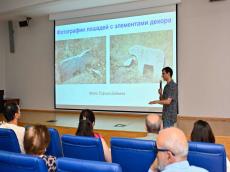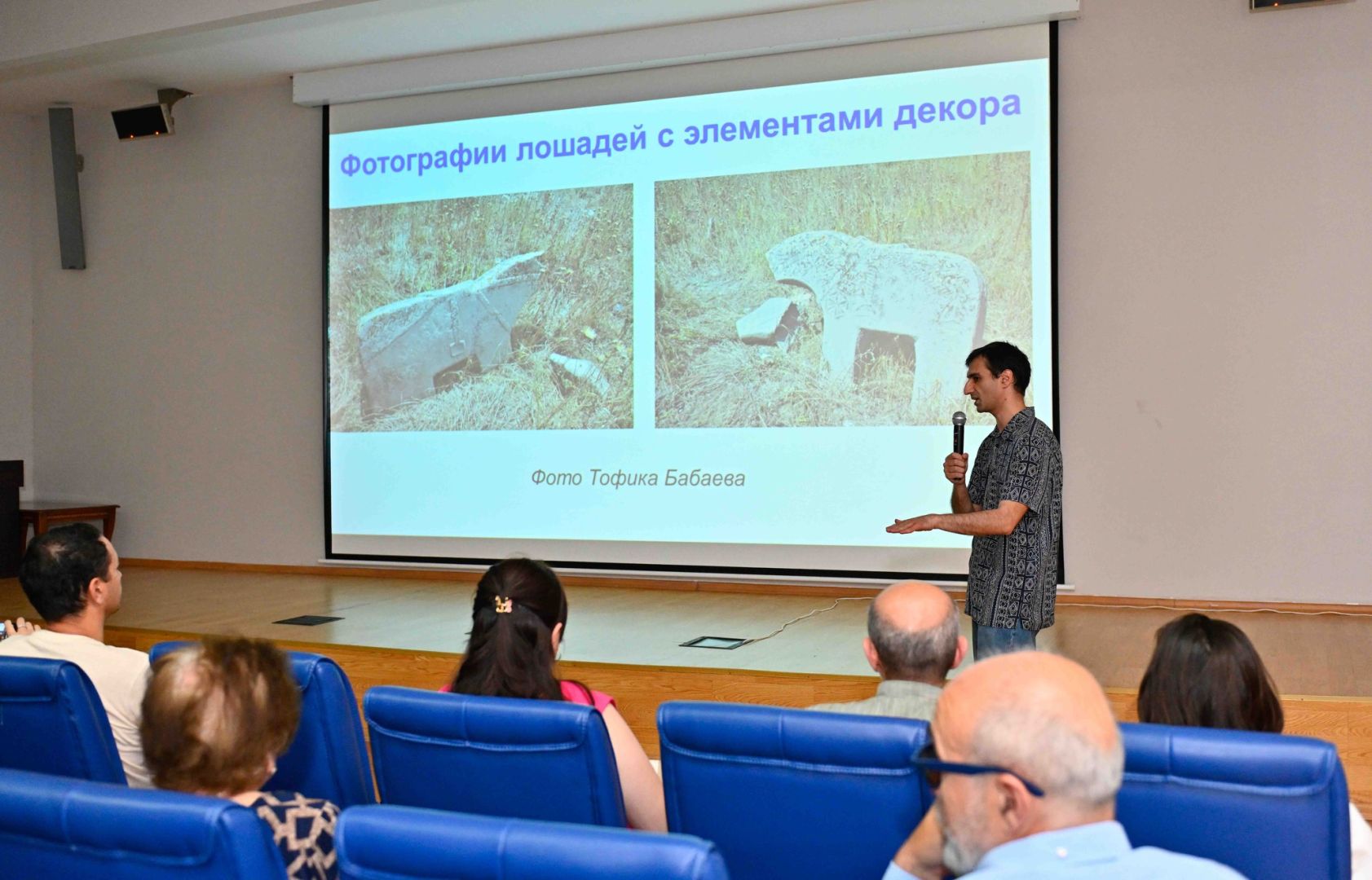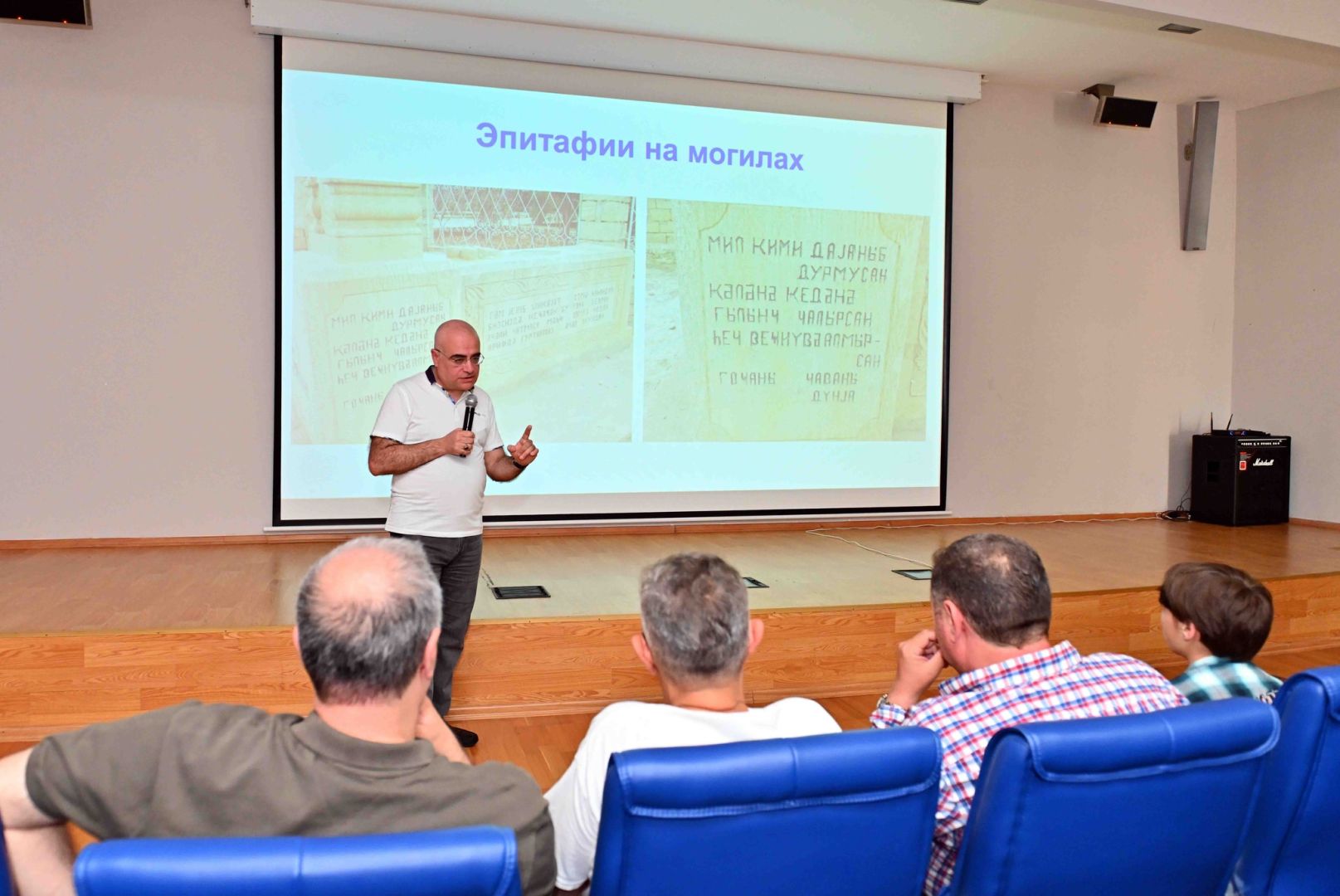|
|
TODAY.AZ / Society
Explore artistic evolution of tombstones in Azerbaijan
10 June 2024 [17:55] - TODAY.AZ
 Laman Ismayilova
Laman Ismayilova
The National Art Museum has hosted? a lecture themed "Art features of tombstones in Azerbaijan. Tradition and modernity," led by researchers of the Institute of Archaeology and Anthropology, Rustam Huseynov and Mehdi Ali.

Speaking with Azernews, Rustam Huseynov noted that the lecture focused on recent anthropological studies on burial customs in Azerbaijan, aiming to illuminate lesser-known facets of Azerbaijani history and culture.
At the lecture, the audience was provided insight into the main features of the artistic design and epigraphy of tombstones in Azerbaijan, the emergence of the classical tradition, and its destruction in the 1970s of the 20th century.
"The presentation highlighted the pre-Islamic elements and pagan symbols found on runic monuments on the territory of Azerbaijan. Special attention was paid to their distinctive features, location, current state, legal status, and influence on the artistic style of subsequent eras. A large amount of lecture material was devoted to the unique monuments of Azerbaijan, which make it possible to trace their evolution through different eras, especially the genesis of cultural traditions, and accurately date the time of change in cultural codes," said Rustam Huseynov.

Of particular interest to the audience were the runes on funerary monuments and the presence of pagan symbols on the tombstones of the Islamic era, the facts of mixing styles, and the existence of different types at the same time.
The audience showed great interest in the runes on funerary monuments and the presence of pagan symbols on Islamic-era tombstones, as well as the blending of different styles.
The lecture participants engaged with the researchers, asking questions about deciphering runic signs and exploring lesser-known historical facts.
Recall that Rustam Huseynov also arranged lectures on "Banknotes of the Azerbaijan Democratic Republic" and "Stamped Coins of Azerbaijan" at the National Art Museum.
Founded in 1937, the National Art Museum offers art connoisseurs some of the best examples of decoratively applied arts in Western Europe.
Over 3,000 items in 60 rooms are on permanent display at the museum, and around 12,000 items are kept in storage. Here, you can see masterpieces of the Italian, French, German, and Polish masters of brush.
The museum has successfully organised and hosted numerous high-level international exhibitions, showcasing the works of renowned artists.
These exhibitions have not only attracted art enthusiasts but have also contributed to the cultural exchange between Azerbaijan and other countries.
URL: http://www.today.az/news/society/249409.html
 Print version
Print version
Connect with us. Get latest news and updates.
See Also
- 23 December 2024 [14:37]
TABIB increases free medical services and insurance coverage - 23 December 2024 [12:28]
Azerbaijan's TABIB reports increased medical services in 2024 - 23 December 2024 [11:58]
TABIB unveils “Strategic Plan for 2025–2027” with focus on medical tourism and international certifications - 22 December 2024 [14:30]
Training week promotes media literacy in Azerbaijan's Ismayilli and Gabala - 22 December 2024 [14:00]
Azerbaijan's Ministry of Defense presents weekly review - 21 December 2024 [14:50]
Azerbaijan's Khojaly witnesses new chapter of hope and renewal - 21 December 2024 [13:45]
Young Researchers Awarded at AMEA's Institute of Archaeology and Anthropology - 21 December 2024 [13:15]
Nakhchivan initiates comprehensive road repair and reconstruction efforts - 21 December 2024 [10:30]
IDPs return to rebuilt Shusha as part of Great Return State Program - 14 December 2024 [17:22]
Regional conference in Masalli addresses religious radicalism and national solidarity
Most Popular
 IDPs return to rebuilt Shusha as part of Great Return State Program
IDPs return to rebuilt Shusha as part of Great Return State Program
 Pashinyan plants a pig for the Armenians
Pashinyan plants a pig for the Armenians
 Azerbaijan, Russia inks agreement on Development of Transit Freight Transportation
Azerbaijan, Russia inks agreement on Development of Transit Freight Transportation
 Sweden's Climate and Environment Minister calls for Shein and Temu to be banned in country
Sweden's Climate and Environment Minister calls for Shein and Temu to be banned in country
 President Ilham Aliyev's remarks in his interview with Dmitry Kiselev in spotlight of world media
President Ilham Aliyev's remarks in his interview with Dmitry Kiselev in spotlight of world media
 S. Korea to launch 3rd homegrown military spy satellite
S. Korea to launch 3rd homegrown military spy satellite
 U.S. finalizes US$4.7 bln in CHIPS Act subsidy to Samsung Electronics
U.S. finalizes US$4.7 bln in CHIPS Act subsidy to Samsung Electronics
